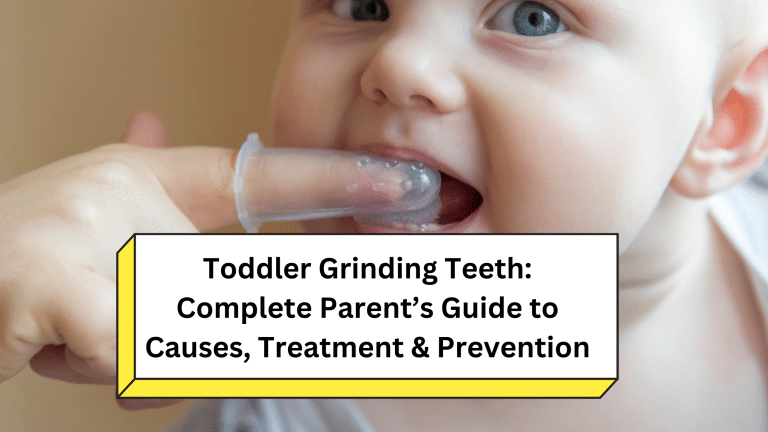
Worried about your toddler grinding their teeth? You’re not alone. Many parents hear strange grinding or clicking noises at night and wonder if something’s wrong. This guide explains what causes teeth grinding (bruxism) in toddlers, when to worry, and how to protect your child’s smile.
What Is Teeth Grinding (Bruxism)?
Teeth grinding, or bruxism, is when a child clenches or grinds their teeth together—often during sleep but sometimes while awake. It can sound like scraping, crunching, or clicking. Most toddlers outgrow it as they develop new teeth and jaw muscles.
How Common Is Teeth Grinding in Toddlers?
Bruxism is very common in young children. Studies suggest up to 30% of toddlers grind their teeth at some stage, usually between ages 1 and 5. It often starts after the first baby teeth appear and may peak during teething phases or early growth spurts.
Why Do Toddlers Grind Their Teeth?
There’s rarely one single cause. Grinding can happen for several reasons, including:
- Teething discomfort: Toddlers may grind to soothe sore gums.
- Developing jaw muscles: Grinding helps strengthen new muscles in the mouth.
- Misaligned teeth or bite: Teeth that don’t fit together comfortably can cause clenching.
- Stress or anxiety: Even toddlers experience mild stress (new routines, separations, tiredness).
- Ear pain or blocked sinuses: Grinding may relieve pressure or discomfort.
- Sleep issues: Disrupted sleep, nightmares, or sleep apnoea can trigger nighttime grinding.
- Medical or developmental factors: In some cases, bruxism is linked with hyperactivity, autism, or certain medications.
Signs and Symptoms of Teeth Grinding
Some toddlers grind loudly enough for parents to hear, but there are also other signs to look for:
- Worn or flattened tooth edges
- Increased tooth sensitivity
- Complaints of jaw pain or headaches in the morning
- Cracked or chipped baby teeth
- Restless sleep or frequent waking
- Chewing on objects, clothing, or toys more than usual
Is Toddler Teeth Grinding Serious?
Usually not. Most children stop grinding on their own by the time they have all their baby teeth or start losing them around age 6. In rare cases, ongoing grinding can wear down teeth or cause jaw pain. Persistent or severe cases should be checked by a dentist.
When Should You See a Dentist?
Book a dental check if:
- Your toddler’s grinding is loud or frequent every night
- You notice damage to their teeth or gums
- They complain of pain or sensitivity
- They snore heavily, gasp, or stop breathing briefly in sleep
- You’re worried about stress or behaviour changes
Early assessment helps rule out underlying dental or medical causes and prevents long-term wear.
Treatment and Management Options
Most toddlers don’t need medical treatment. The focus is on comfort and prevention. Here’s what parents can do:
1. Ease Teething and Gum Discomfort
- Offer a chilled (not frozen) teething ring.
- Use gentle gum massage with a clean finger.
- Give water to help relieve tension in the mouth.
2. Reduce Stress and Promote Relaxation
- Keep bedtime routines calm and predictable.
- Read or sing to your child before sleep.
- Avoid stimulating activities (screens, rough play) right before bed.
3. Encourage Good Sleep Habits
- Set regular sleep and nap schedules.
- Keep the bedroom dark, cool, and quiet.
- Limit sugar or caffeine (such as chocolate) in the evening.
4. Dental Check-Ups
Your child should have their first dental visit by age one. The dentist will check for signs of wear, jaw growth, and overall oral health. If needed, they may suggest a soft night guard (though rarely used in very young children).
5. Treat Underlying Causes
If your toddler grinds due to ear infections, blocked airways, or anxiety, treating those conditions often stops the grinding too. Your GP or dentist may refer you to a specialist if needed.
How to Prevent Teeth Grinding in Toddlers
- Ensure a calm, consistent bedtime routine.
- Keep up with regular dental visits (every 6–12 months).
- Monitor for new teeth or jaw changes.
- Discourage daytime chewing on hard toys or objects.
- Encourage relaxation and physical play during the day to release energy.
Home Care Tips for Parents
Here are some quick practical steps you can take at home:
- Note when the grinding happens (daytime, nighttime, or both).
- Keep a sleep diary for a week or two to discuss with your dentist.
- Check for chipped or worn teeth monthly.
- Offer water before bed to keep the mouth hydrated.
- Avoid sugary drinks near bedtime to reduce tooth decay risk.
Frequently Asked Questions
Is it normal for toddlers to grind their teeth while sleeping?
Yes. Many toddlers grind their teeth during light sleep stages. It often goes away as they grow older.
Can grinding damage baby teeth?
In most cases, no. But frequent or intense grinding can wear down enamel. Regular check-ups help spot early signs.
Does my child need a mouthguard?
Usually not. Mouthguards are only used if grinding causes pain, tooth wear, or jaw issues, and typically for older children.
Can diet or hydration affect grinding?
Yes. Dehydration and high sugar intake can increase grinding risk. Encourage plenty of water and limit sugary snacks.
When will the grinding stop?
Most children stop grinding their teeth between ages 5 and 7, once adult teeth begin to emerge and their bite stabilises.
Key Takeaways for Parents
- Teeth grinding is common in toddlers and usually harmless.
- Monitor for pain, worn teeth, or disturbed sleep.
- Keep dental visits regular to check jaw growth and tooth wear.
- Encourage calm routines and healthy sleep habits.
- Seek advice from your dentist or GP if you’re worried.
This guide is based on NHS and dental health best practices. It’s for general information only and not a substitute for professional medical advice. Always consult a qualified dentist or GP if you have concerns about your child’s oral health.
